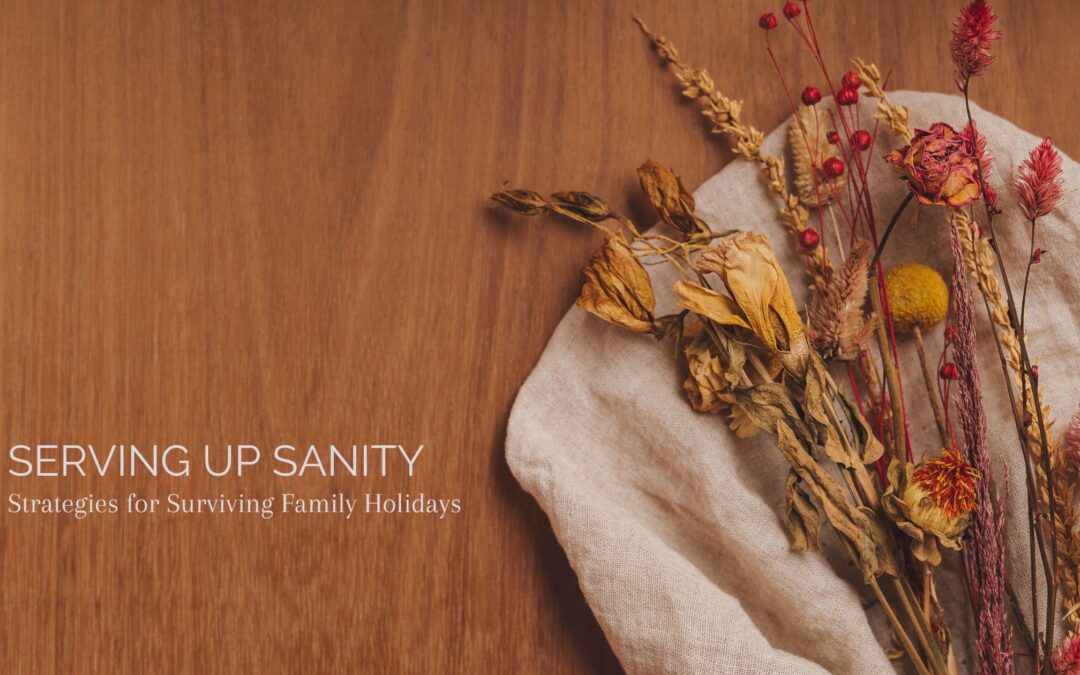As an enthusiastic supporter of pie and carbs, Thanksgiving has always been one of my favorite holidays. As a psychologist, it’s also a very busy season. Conceptually I love the idea of gratitude for bounty and harvest and setting aside time to gather with family and friends. While this holiday can be a source of joy and togetherness (and the aforementioned pies), it can also present challenges in dealing with family dynamics. Read on for some simple strategies to make the most of your time with family this holiday season.
Set realistic expectations. If you go in knowing that Aunt Esther is inevitably going to corner you and ask when you’re going to have a baby, or that Cousin Brad is going to try to start a political debate instead of quietly passing the mashed potatoes, you can better manage your reactions. Look, this isn’t suddenly going to be the year that your reproductive choices or voting record aren’t under a microscope. Have some canned responses at the ready, don’t be afraid to employ some humor, understand every family has their quirks, and don’t focus on a flawless gathering but instead connection – where you can find it.
- Set boundaries. Setting boundaries is crucial for maintaining your emotional wellbeing during Thanksgiving. If certain topics or behaviors trigger stress or discomfort, communicate your boundaries assertively but kindly. It’s ok to let your family know what’s off limits for discussion and encourage them to do the same.
- Focus on gratitude. Try to shift your focus from family conflicts to the aspect of your family you’re grateful for. That cousin you never get to see, or your mother in law’s mind-blowing stuffing, or the way your brother has really stepped up to be an amazing uncle to the new generation. Some families have a tradition of going around the table and saying what they’re thankful for. If that’s your family, think of some things ahead of time so you can focus on the good, in the moment. If it’s not your family, consider starting the tradition to remind the entire group to focus on gratitude. If the whole idea of that makes you break out in stress hives, forget I said anything about public speaking and focus on your own gratitude privately.
- Be mindful of your reactions. In the heat of the moment, it’s easy to react emotionally to family members’ comments or actions. Instead, practice mindfulness by taking a breath and pausing before responding. Even taking just a brief moment to create space between reaction and behavior can be enough to diffuse tension, and help you compose a more constructive response.
- Seek Support. If the stress of Thanksgiving is overwhelming, don’t hesitate to reach out to a trusted friend, or a therapist. Sometimes it’s hard to see the forest for the trees, and you need help from someone on the outside to untangle things.
- Don’t go! Don’t tell your in-laws I said this, but you, gentle reader, are allowed to opt out. What I’ve discussed here applies to families that are quirky, maybe annoying, maybe difficult, but ultimately loving. If your family is abusive, or emotionally unsafe to be around, or this just isn’t the right year, skip it. Stay home and have snacks for dinner or make lasagna instead of turkey. Have a Friendsgiving, where everyone brings a dish and you make memories with chosen family. Skip it entirely, go about your business, and pretend it’s just another day. There are no rules, and traditions that don’t benefit anyone aren’t worth keeping.

Happy Thanksgiving!
Photo credits:
Photo by Diliara Garifullina on Unsplash
Photo by Karolina Badzmierowska on Unsplash


 Set realistic expectations. If you go in knowing that Aunt Esther is inevitably going to corner you and ask when you’re going to have a baby, or that Cousin Brad is going to try to start a political debate instead of quietly passing the mashed potatoes, you can better manage your reactions. Look, this isn’t suddenly going to be the year that your reproductive choices or voting record aren’t under a microscope. Have some canned responses at the ready, don’t be afraid to employ some humor, understand every family has their quirks, and don’t focus on a flawless gathering but instead connection – where you can find it.
Set realistic expectations. If you go in knowing that Aunt Esther is inevitably going to corner you and ask when you’re going to have a baby, or that Cousin Brad is going to try to start a political debate instead of quietly passing the mashed potatoes, you can better manage your reactions. Look, this isn’t suddenly going to be the year that your reproductive choices or voting record aren’t under a microscope. Have some canned responses at the ready, don’t be afraid to employ some humor, understand every family has their quirks, and don’t focus on a flawless gathering but instead connection – where you can find it.